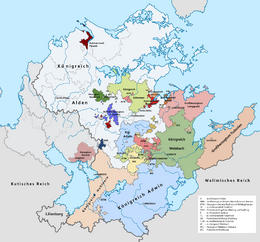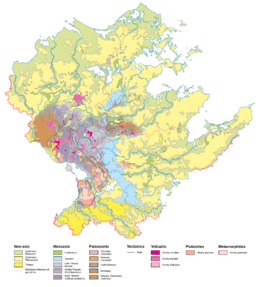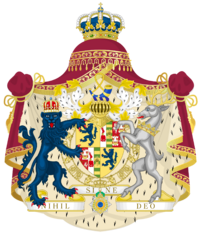Mascylla: Difference between revisions
No edit summary |
No edit summary |
||
| Line 122: | Line 122: | ||
The area of what is now Mascylla was originally inhabited by a collection of {{wp|Germanic ethnic groups|Telmerian tribes}}, most notably the Therunders (''Terunder''), Falians (''Fahlier''), Aldens (''Aldier'') and Adhuins (''Adhuiner'') since {{wp|classical antiquity}}. Following ill-fated attempts by the [[Cambran Empire]] to expand northward beyond modern-day [[Dulebia]] and its subsequent collapse in the aftermath of the {{wp|Migration Period}} by 300 AD, the newly founded [[Albarian Kingdom]] annexed southern Mascylla while introducing Cambran innovations and customs to the region and developing a distinctive culture and language as the basis for modern Mascyllary culture. The presence of the Albarians prompted the slow creation of duchies and states from the Mascyllary tribes, and by 1000 AD most of Mascylla had been organized into a patchwork of petty kingdoms and duchies. Soon after, religious disputes and a prolonged series of dynastic disputes dominated Mascyllary politics in the {{wp|Middle Ages}}, increasingly influenced by growing predecessors to the [[First Cuthish Empire]]. | The area of what is now Mascylla was originally inhabited by a collection of {{wp|Germanic ethnic groups|Telmerian tribes}}, most notably the Therunders (''Terunder''), Falians (''Fahlier''), Aldens (''Aldier'') and Adhuins (''Adhuiner'') since {{wp|classical antiquity}}. Following ill-fated attempts by the [[Cambran Empire]] to expand northward beyond modern-day [[Dulebia]] and its subsequent collapse in the aftermath of the {{wp|Migration Period}} by 300 AD, the newly founded [[Albarian Kingdom]] annexed southern Mascylla while introducing Cambran innovations and customs to the region and developing a distinctive culture and language as the basis for modern Mascyllary culture. The presence of the Albarians prompted the slow creation of duchies and states from the Mascyllary tribes, and by 1000 AD most of Mascylla had been organized into a patchwork of petty kingdoms and duchies. Soon after, religious disputes and a prolonged series of dynastic disputes dominated Mascyllary politics in the {{wp|Middle Ages}}, increasingly influenced by growing predecessors to the [[First Cuthish Empire]]. | ||
After the Adwhinish Wars and War of Kalaphay Succession in 1569 and 1603 respectively, two nations had emerged as regional powers, [[Aldia]] and [[Adwhin]], vying for hegemony over the remaining Mascyllary states, with Aldia rapidly rising with a {{wp|colonialism|colonial empire}} it had acquired from Cuthland in the 1700s. The hostilities between both nations began to grow and, following the gradual dwindling of power of the Cuthish Empire in the latter 18th century that left a {{wp|power vacuum}} in Mascylla's central provinces, three consecutive wars of unification were fought in the 1740s, 1760s and 1770s respectively. The epitome of violence would be reached in the [[War of the Five Kings]] from 1789 to 1793, with [[Aldia]], leading a [[Elbgau Confederacy|confederacy of states]] against [[Adwhin]] and ultimately emerging victorious. The subsequent Treaty of Langquaid negotiated the unification of Mascylla into a nation state with a continuation of the Aldian monarchy at its helm. The [[Collapse of Cuthland|collapse of Cuthland]] and its slow [[Partition of Cuthland|partition | After the Adwhinish Wars and War of Kalaphay Succession in 1569 and 1603 respectively, two nations had emerged as regional powers, [[Aldia]] and [[Adwhin]], vying for hegemony over the remaining Mascyllary states, with Aldia rapidly rising with a {{wp|colonialism|colonial empire}} it had acquired from Cuthland in the 1700s. The hostilities between both nations began to grow and, following the gradual dwindling of power of the Cuthish Empire in the latter 18th century that left a {{wp|power vacuum}} in Mascylla's central provinces, three consecutive wars of unification were fought in the 1740s, 1760s and 1770s respectively. The epitome of violence would be reached in the [[War of the Five Kings]] from 1789 to 1793, with [[Aldia]], leading a [[Elbgau Confederacy|confederacy of states]] against [[Adwhin]] and ultimately emerging victorious. The subsequent Treaty of Langquaid negotiated the unification of Mascylla into a nation state with a continuation of the Aldian monarchy at its helm. The [[Collapse of Cuthland|collapse of Cuthland]] and its slow [[Partition of Cuthland|partition]] enabled Mascylla to vastly expand its Berean as well as [[Pamira|Pamiran]] and [[Alvinia|Alvinian]] colonies. Moreover, Mascyllary culture and commerce flourished by the turn of the 19th century, and the Aldian colonial system expanded into a global colonial empire that was the third-largest by the 1830s. However, with the rise of the [[Second Cuthish Empire]] under X and following the [[Second Cutho-Mascyllary War]] (1830–41), Mascylla was utterly defeated and [[Treaty of Alderport|forced]] to cede pre-1758 Cuthish territories in Mascylla as well as a portion of its colonial possessions. The ensuing antagonization by the Mascyllary populous and the {{wp|French-German enmity|mutual hateship}} between both countries that had developed over the last two hundred years was a decisive factor in the causing of the [[Great War (Aurorum)|Great War]] (1910–16). As a major participant and ultimately victor of the war with its allies, it set the [[Treaty of Lehpold|terms of peace]], crippling Cuthland's military, economy and territorial extent, as well as reshaping the geopolitical order through the establishment of the [[Assembly of Nations]] in 1917. War-torn conservative Mascylla however succumbed to increasing calls for reform by the {{wp|worker class}}, with the [[Mascyllary Revolution]] overthrowing the to this point ''de facto'' absolute monarchy and instituting a democratic {{wp|republic}} with a constitutionally regulated monarch in 1924. An unprecedented {{wp|economic boom}} in the 1920s and 1930s quickly recovered the damaged economy while solidifying the recently introduced democracy. | ||
The enmities left by the Great War proved to be pivotal in the later course of the 20th century, when a re-organized Cuthland leading the [[Mageiros League]] and X rivaled the western democratic nations united by the X. While Mascylla kept clinging onto its colonial possessions, the [[Melasian Crisis]] from 1941 to 1943 triggered the slow {{wp|decolonization}} of its empire as well as the beginning of the [[Great Game (Aurorum)|Great Game]] (1944–1990). The 1960s and 1970s saw civil unrest and dissatisfaction with the country's policies, and additional [[Revolutionary Garrison|terrorist movements]] and scandals further dragged Mascylla into a decade-long crisis, culminating into the [[July 20 attacks|July 20 1991 terrorist attacks]]. After numerous reconciliation attempts by the democratic and communist blocs and following the [[1989 fiancial crisis (Aurorum)|1989 fiancial crisis]], the X collapsed, leaving Cuthland and Mascylla as the two remaining rivals of the former Great Game. Recent reapproachment with post-communist states beginning in the 1990s however kept diplomatic tensions between the two at bay. | The enmities left by the Great War proved to be pivotal in the later course of the 20th century, when a re-organized Cuthland leading the [[Mageiros League]] and X rivaled the western democratic nations united by the X. While Mascylla kept clinging onto its colonial possessions, the [[Melasian Crisis]] from 1941 to 1943 triggered the slow {{wp|decolonization}} of its empire as well as the beginning of the [[Great Game (Aurorum)|Great Game]] (1944–1990). The 1960s and 1970s saw civil unrest and dissatisfaction with the country's policies, and additional [[Revolutionary Garrison|terrorist movements]] and scandals further dragged Mascylla into a decade-long crisis, culminating into the [[July 20 attacks|July 20 1991 terrorist attacks]]. After numerous reconciliation attempts by the democratic and communist blocs and following the [[1989 fiancial crisis (Aurorum)|1989 fiancial crisis]], the X collapsed, leaving Cuthland and Mascylla as the two remaining rivals of the former Great Game. Recent reapproachment with post-communist states beginning in the 1990s however kept diplomatic tensions between the two at bay. | ||
Revision as of 20:37, 4 August 2020
This article is incomplete because it is pending further input from participants, or it is a work-in-progress by one author. Please comment on this article's talk page to share your input, comments and questions. Note: To contribute to this article, you may need to seek help from the author(s) of this page. |
Crowned Republic of Mascylla Gekrönte Republik Maskillien (Hesurian) | |
|---|---|
Motto: "Hier stehen Wir" "Here We Stand" | |
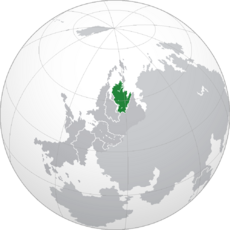 Location of Mascylla (dark green) in Berea (dark grey and green) | |
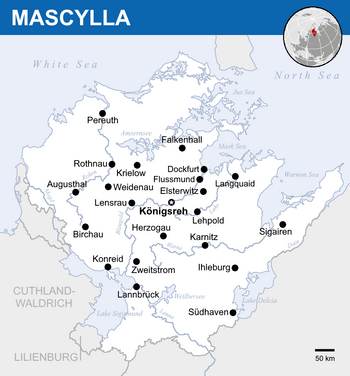 | |
| Capital | Königsreh |
| Largest city | Flussmund |
| Official languages | Hesurian |
| Recognised national languages | Cuthish, Waldish, Falian, Warnoan |
| Ethnic groups | 84.2% Mascyllary 10.5% other Telmerian 3.0% Black 2.3% Other |
| Demonym(s) | Mascyllary |
| Government | Federal parliamentary constitutional monarchy |
• Queen | Dorothea I |
| Thomas Falkner | |
| Walther Steintz | |
| Egon Weidmann | |
| Legislature | Parliament |
| Reichssenat | |
| Reichsrat | |
| Establishment | |
• Congress of Rehnern | 20 December 1757 |
| 4 September 1789—29 March 1793 | |
• Treaty of Langquaid signed | 18 May 1793 |
• Coronation of Lukas I | 23 May 1793 |
| 10 May 1923—22 January 1924 | |
• Current constitution adopted | 24 January 1924 |
• Coronation of Maximilian I | 5 March 1924 |
| Area | |
• Total | 542,017.0 km2 (209,273.9 sq mi) |
• Water (%) | 2.1% |
| Population | |
• 2019 estimate | |
• 2018 census | |
• Density | 90.4/km2 (234.1/sq mi) |
| GDP (PPP) | 2018 estimate |
• Total | |
• Per capita | |
| GDP (nominal) | 2018 estimate |
• Total | |
• Per capita | |
| Gini (2017) | low |
| HDI (2016) | very high |
| Currency | Mascyllary Karning (MKN, Ӄ) |
| Date format | DD/MM/YYYY |
| Driving side | right |
| Calling code | +47 |
| Internet TLD | .mc |
Mascylla (Hesurian: Maskillien), officially the Crowned Republic of Mascylla (Hesurian: Gekrönte Republik Maskillien) and sometimes rarely referred to as Mascillia, is a sovereign state on the Telmerian peninsula in northern Berea. It is bordered to the west by X, Lilienburg and Lake Sigismund, to the south by X, to the east by X, and to the north by the North Sea and White Sea, with additional maritime boundaries to Cuthland-Waldrich in the west and X to the north. Königsreh is the country's capital city, and with Flussmund as the largest city are the two main cultural and economic centres of Mascylla; other major cities and urban areas include Langquaid, Augusthal, Lannbrück, Dockfurt, Karnitz, Weidenau and Konreid. With a population of roughly 49 million inhabitants as of 2018 and a territorial area of 542,017 km2 (209,273.9 sq mi), Mascylla is both the second-most populous and second largest country in Telmeria.
Mascylla is a federal parliamentary constitutional monarchy since its formal establishment in 1793. Current monarch since 2015 and the first female head of state in Mascylla's history is Dorothea I, while Thomas Falkner is elected head of governemnt as Prime Minister since 2016. The constitution adopted in 1924 determines the separation of power is exercised by the country's Reichsrat and Reichssenat, the Kronenrat, formally by the ruling Monarch, and the High Court.
The area of what is now Mascylla was originally inhabited by a collection of Telmerian tribes, most notably the Therunders (Terunder), Falians (Fahlier), Aldens (Aldier) and Adhuins (Adhuiner) since classical antiquity. Following ill-fated attempts by the Cambran Empire to expand northward beyond modern-day Dulebia and its subsequent collapse in the aftermath of the Migration Period by 300 AD, the newly founded Albarian Kingdom annexed southern Mascylla while introducing Cambran innovations and customs to the region and developing a distinctive culture and language as the basis for modern Mascyllary culture. The presence of the Albarians prompted the slow creation of duchies and states from the Mascyllary tribes, and by 1000 AD most of Mascylla had been organized into a patchwork of petty kingdoms and duchies. Soon after, religious disputes and a prolonged series of dynastic disputes dominated Mascyllary politics in the Middle Ages, increasingly influenced by growing predecessors to the First Cuthish Empire.
After the Adwhinish Wars and War of Kalaphay Succession in 1569 and 1603 respectively, two nations had emerged as regional powers, Aldia and Adwhin, vying for hegemony over the remaining Mascyllary states, with Aldia rapidly rising with a colonial empire it had acquired from Cuthland in the 1700s. The hostilities between both nations began to grow and, following the gradual dwindling of power of the Cuthish Empire in the latter 18th century that left a power vacuum in Mascylla's central provinces, three consecutive wars of unification were fought in the 1740s, 1760s and 1770s respectively. The epitome of violence would be reached in the War of the Five Kings from 1789 to 1793, with Aldia, leading a confederacy of states against Adwhin and ultimately emerging victorious. The subsequent Treaty of Langquaid negotiated the unification of Mascylla into a nation state with a continuation of the Aldian monarchy at its helm. The collapse of Cuthland and its slow partition enabled Mascylla to vastly expand its Berean as well as Pamiran and Alvinian colonies. Moreover, Mascyllary culture and commerce flourished by the turn of the 19th century, and the Aldian colonial system expanded into a global colonial empire that was the third-largest by the 1830s. However, with the rise of the Second Cuthish Empire under X and following the Second Cutho-Mascyllary War (1830–41), Mascylla was utterly defeated and forced to cede pre-1758 Cuthish territories in Mascylla as well as a portion of its colonial possessions. The ensuing antagonization by the Mascyllary populous and the mutual hateship between both countries that had developed over the last two hundred years was a decisive factor in the causing of the Great War (1910–16). As a major participant and ultimately victor of the war with its allies, it set the terms of peace, crippling Cuthland's military, economy and territorial extent, as well as reshaping the geopolitical order through the establishment of the Assembly of Nations in 1917. War-torn conservative Mascylla however succumbed to increasing calls for reform by the worker class, with the Mascyllary Revolution overthrowing the to this point de facto absolute monarchy and instituting a democratic republic with a constitutionally regulated monarch in 1924. An unprecedented economic boom in the 1920s and 1930s quickly recovered the damaged economy while solidifying the recently introduced democracy.
The enmities left by the Great War proved to be pivotal in the later course of the 20th century, when a re-organized Cuthland leading the Mageiros League and X rivaled the western democratic nations united by the X. While Mascylla kept clinging onto its colonial possessions, the Melasian Crisis from 1941 to 1943 triggered the slow decolonization of its empire as well as the beginning of the Great Game (1944–1990). The 1960s and 1970s saw civil unrest and dissatisfaction with the country's policies, and additional terrorist movements and scandals further dragged Mascylla into a decade-long crisis, culminating into the July 20 1991 terrorist attacks. After numerous reconciliation attempts by the democratic and communist blocs and following the 1989 fiancial crisis, the X collapsed, leaving Cuthland and Mascylla as the two remaining rivals of the former Great Game. Recent reapproachment with post-communist states beginning in the 1990s however kept diplomatic tensions between the two at bay.
Mascylla today retains its political, cultural and economic power amassed in the 19th and 20th centuries. As the 3rd largest economy by both nominal GDP and by PPP, Mascylla is a highly developed country. It additionally ranks highly in rankings of human development, education, political and personal freedom, healthcare, life expectancy and economic competitiveness. Generally considered to be one of the world's great powers, it is a permanent member state of the Assembly of Nations Security Council and recognized country possessing nuclear weapons.


